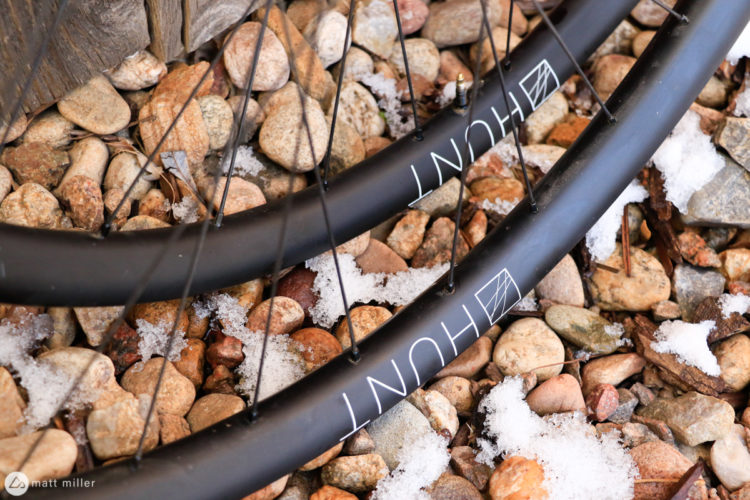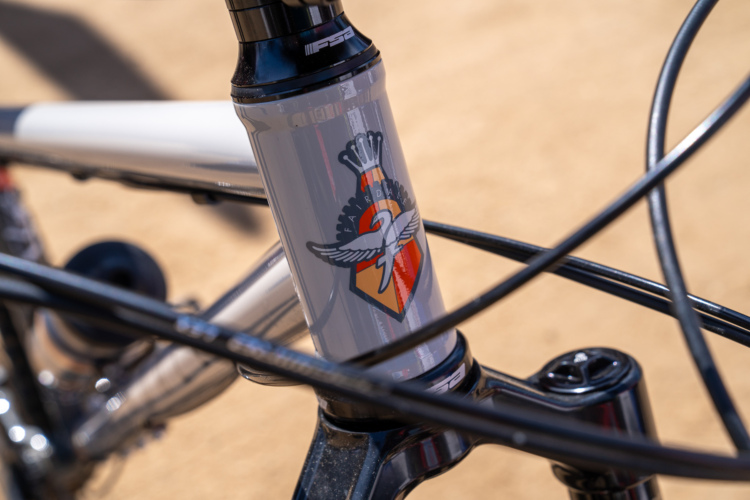To say it’s been an unusual year is an understatement. Most of the usual festivals, trade shows, and competitions were cancelled in 2020, leaving bike brands few opportunities to debut new products in person. Additionally, a surprise jump in mountain bike participation has left brands scrambling to meet demand. For now, the mountain bike industry is healthy, if not booming, in spite of the precarious state of the global economy.
The Singletracks staff took a look at some of the most innovative and intriguing mountain bike products that debuted in 2020, and along the way we spotted a few trends. While it’s true that many of these have been simmering for a while now, all have accelerated this year in the face of unprecedented changes.
Flex-stays gain traction

Over the past few months we’ve seen a flurry of bike releases that are ditching the pivot that we’d normally see at the chain and seat stay on a Horst-link for a solid rear triangle with flex tuned into the chain and/or seat stays. So far the trend is limited to lightweight XC-style mountain bike designs.
Cannondale featured a flex stay in their May release of the new Scalpel, helping the brand achieve a very low frame weight on their go-to XC bike. In June Transition released the first “cross-country” bike in years, called the Spur, and to save weight, Transition opted for a single-pivot design with flex tuned into the seat stays. The design helps them cut weight and create a “responsive feel on the trail.”
Specialized even added a flex stay to their latest generation Stumpjumper trail bike. With the new single-pivot layout, Specialized says it was able to cut 100g on size S4 frames compared to the previous Horst-link design, though part of the weight savings is also due to a new carbon layup process. Either way, one less set of pivot hardware is something we’ll probably see more brands exploring to shave grams on their shorter-travel bikes.
Lighter, less powerful electric mountain bikes
It’s safe to assume that lighter e-bikes are on the horizon thanks to slow but steady advances in technology, but the real surprise is the shortcut brands like Specialized and Orbea are using to get there right away. Some of the latest e-bikes are actually less powerful than their predecessors, because designers have packed smaller motors and batteries for a more classic ride feel.

Since this is such a new trend it’s hard to say whether it’s being driven by riders who have found they don’t need as much power, or if it’s simply a trial to see how broad the market is for eMTBs (e-bike quiver, hello!). If this does hold, it could satisfy critics who fear electric mountain bikes are already or will ultimately become too fast to be safely operated alongside mixed trail users.
Is an e-bike a bicycle or a motorcycle? That’s a question that’s still up in the air for many consumers, but this trend could tilt things back toward bikes.
Additional coil shock options
Trail bike rear travel has slithered into the 140mm to 150mm range over the past few years, and many of those platforms work well with both air and coil-sprung shocks. Riders can swap in a coil shock for rougher and longer alpine riding, where small bump performance and consistency are key, leaving the air can to cover shorter descents and lofty jump line sessions.

Cane Creek popped out a springy new baby this season with their Kitsuma coil and air shocks. The refined damping platform offers external adjustment for high and low-speed compression and rebound, with an adjustment range that Cane Creek claims is wide enough to forego custom tunes for most bikes. The tool-free tuning knobs use clicks and visual markings to indicate placement, so there’s no need to close the compression or rebound circuit and recount the clicks every time you want to adjust something.
Formula also jumped in the expanding rear suspension pool this year with their home-tuneable Mod shock. Like their forks, the compression damping circuit on the Mod can be swapped out with three different valves to create the precise damping a rider is looking for. From there the shock has the usual compression and rebound clicks, preload, multiple spring rates to choose from, and a climb switch that nearly turns the bike into a hardtail.
With other great coil shocks available from DVO, Extreme Shocks, Fast Suspension, Fox, RockShox, X-Fusion, MRP, Öhlins, Push, and others, it’s prime time to test out some squish.
Online ordering and customization
In spite of the relentless and impressive advances we’ve seen in mountain bike gear design and manufacturing over the past couple of decades, the bike industry itself has been relatively slow to embrace the internet and e-commerce. This year Covid-19 accelerated the trend toward more online bike purchase and customization options, which seem to have largely benefitted consumers.
With many bike shops slammed and service appointments difficult to secure, MRP rolled out a program that makes it much easier for home mechanics to complete a fork swap themselves. Buyers enter details about their bike setup online when ordering a fork, and MRP will cut the steerer tube to size, install a star nut and crown race, and include the proper brake adapter. By offering a customized product and saving customers time, brands like MRP are finding ways to deliver more value directly to consumers.

Speaking of customization, flip chips continue to be a popular feature on 2020 mountain bikes and offer buyers a way to get exactly the ride characteristics they want out of a mass-produced frame. Companies like Cascade Components are also stepping in to offer bike owners even more options for customizing performance, and we expect to see other small brands offering similar aftermarket products, and even bike brands themselves getting into the game with add-ons and updated parts for existing bikes.
These days even pump tracks can be ordered online (sorta), and while many direct-to-consumer brands have been shipping bikes to buyers’ doors for years now, in 2020 the whole process feels more dialed than ever before. Today, unboxing a Canyon or YT mountain bike isn’t too far off from opening a brand new iPhone, with easy-to-read instructions and the tools anyone can use to assemble the bike safely. The brands even make returns as easy as possible; YT dedicates a couple pages in the included instruction manual to re-packing the bike in its box in case it needs to be shipped back for any reason.

Hand-me-down tech
Like younger siblings eventually get to wear their taller cousin’s clothes, mountain bike tech eventually moves down the line to make the more affordable bits better. Shimano handed down some of the high-end goodness this year with their new Deore 12-speed drivetrain, retailing for roughly the price of an XTR derailleur.

The 12-speed Deore uses Shimano’s new Micro Spline freehub, offering up a 10-51t steel cassette, their Hyperglide+ tech, and direct mount chainrings. For folks who don’t want to buy new hubs or freehub bodies, there’s an 11-speed version that clicks between 11 and 51 cog teeth, and a trusty 10-speed offering with an 11-46t cassette. Both the 10- and 11-speed cassettes fit the original Shimano HG freehub body. The full kit includes affordable hubs, derailleurs, shifters, and cranks for each of the 10-, 11-, or 12-speed options.
All of this handed down goodness allows riders to get into the sport at a more reasonable price, or to build up their winter bike with solid, affordable components. The cherry on top is a set of four-piston M6120 brakes that use the brand’s short freestroke and impressive power. The comfortable levers are I-SPEC EV compatible, so dropper or lockout levers that pair with other new Shimano gear will mate with the Deore brakes.
Domestic manufacturing

The bike industry has been a global one since well before the start of mountain biking, and one person’s “overseas” is another’s backyard. Still, it seems more companies are finding ways to create products in places where it hasn’t always made sense to do so.
Clothing brand Kitsbow cuts and sews many items at their factory in North Carolina, in addition to cloth masks and PPE (how 2020 is that?). A $79 shirt may not be for everyone, but the upshot is tha domestic manufacturing cuts down on the carbon footprint associated with shipping goods around the world, which also ties into the trend we’re seeing in more sustainable and environmentally-friendly MTB gear.
Brands often choose overseas manufacturing because it’s cost-effective, but ENVE has found a way to build more affordable gear at home. The brand announced this year that they will be producing their $1,600 AM30 carbon wheel set in the USA at their Utah facility alongside the more expensive $2,500+ models already being built there.
Small batch manufacturers like Cascade Components and Wolf Tooth make all or most of their products in house using high-tech machines to keep product runs cost-effective. This way, they can profitably design and produce innovative products despite facing limited markets for things like front derailleur mount covers and various “Boostinator” wheel adapters to fit all the different hub configurations out there.
Brands are doubling down on sustainability

Buzz words like “sustainable” and “green” have increased across the board in many markets, and lately, there has been increased talk about bike companies making their products more sustainable. This year, we saw the first plant-based tire sealant and we are getting more earth-friendly clothing, bike, and wheel options.
Italian brand Efetto Mariposa released a new sealant that’s completely biodegradable and made from olive pits. “Végétalex contains only plant-based particles and fibers – finely ground olive stones and cellulose fibers – to deliver a tremendous puncture clogging effect. This mix, held together by xanthan gum (produced from simple sugars), fixes punctures ranging from small tire porosities to bigger cuts (up to 5 mm) fast and permanently.” Just make sure to keep your tire sealants separate from cooking oils.

Revel Bikes is also doing some great things on the sustainability front with their new wheels. Revel claims their new FusionFiber contains no environmentally harmful epoxy and because of that, the fibers don’t need to be stripped down, making recycling much easier, something that has been problematic for carbon fiber manufacturing. So, Revel Wheels can be recycled much easier than other carbon fibers, and they have already turned a lot of their wheel scrap into tire levers.
Though they debuted this new tech in 2019, Denver-based Guerrilla Gravity has also made strides with carbon fiber that is easy to recycle. Combine that with their short supply chain methods and made-in-America bikes and GG is another brand that’s working to reduce their environmental footprint.
Keep an eye on these trends as we head into 2021, where the only thing we know for sure is that things will change!



















